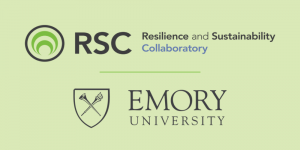
By: Clare McCarthy, General Sustainability Intern, Office of Sustainability Initiatives
The Resilience and Sustainability Collaboratory (RSC) is a newly established, Emory-based “think and do tank” that unites the expertise of thought leaders from corporate, governmental, non-governmental, community, and academic groups from Emory and beyond in order to address complex challenges at the nexus of the environment and society. It serves as a US-based anchor to the Resilience Alliance, an international research network which explores the dynamics of social-ecological systems.
The RSC was founded earlier this year, as the local effects of climate change, racial injustices, and economic inequities are becoming increasingly difficult to overlook as isolated issues. An Atlanta location was a deliberate decision, as the region is becoming increasingly vulnerable to a wide range of foreseeable natural, economic, and civil disturbances.
The RSC includes 24 Emory faculty members from 16 different departments. These faculty work alongside non-Emory leaders to advance the RSC’s position as a leader in novel approaches to cross-disciplinary and cross-sector issues by developing local projects which can be scaled to support global transformation. Drawn to the RSC’s interdisciplinary nature, 20+ corporate prospects spanning a variety of business sectors (i.e. agricultural, technology, construction, real estate, finance, beverage, automotive, etc.) will also contribute their expertise to the initiative.
The RSC currently dedicates itself to a collection of ambitious projects related to environmental change, human health, and social justice.
Addressing concerns of social and economic justice, the RSC promotes resilience in food supply by supporting local farmers who are likely to lose their land to development. Through the Conservation Fund, the Working Farms Fund acquires and preserves farmland within 100 miles of Atlanta, then leases it to farmers with a 5-10 year path to ownership. Emory’s commitment to purchase these farmers’ produce provides farmers with stability and helps Emory to advance a 2025 goal of procuring 75% of its food from local or sustainably grown sources. Emory’s agreement with the Working Farm Fund also enables Emory faculty and students to conduct climate-smart agriculture research on the farmland.
Not only does the RSC work to protect vulnerable farmers, but it strives to protect the health of vulnerable communities by restoring the health of their land and soil. The RSC faculty member, Eri Saikawa, partnered with Historic Westside Gardens Atlanta Inc., Environmental Protection Agency Region 4, and the Georgia Department of Public Health to test soil in Atlanta’s Westside neighborhood. The study found high soil levels of heavy metals and metalloids (HMM), which can have serious health consequences for the inhabitants of the land. These high levels were especially concerning because of the lack of community awareness of the risks of contaminated soil and of only minimal testing of children’s blood levels. As a result of the RSC’s work, the Environmental Protection Agency (EPA) began an investigation into the West Atlanta neighborhood, and a Superfund cleanup is now underway. The RSC hopes that its systematic approach to testing and community-engaged remediation can be replicated in other vulnerable communities.
Another health-oriented initiative of the RSC is its Children’s Healthcare Clinic, which will create, model and share best practices in the provision of green, disaster-prepared health care, while training future health professionals to provide greener health care. This initiative prioritizes children in low-income communities who are projected to bear the majority of climate change-related health impacts.
The RSC will also contribute its capabilities to working with Emory administrators and students to produce an on-campus prototype for anaerobic digestion (AD) that reduces food waste and produces renewable biogas and healthy soil amendments. Emory recently received a Environmental Protection Agency’s Sustainable Materials Management grant to begin this project. The AD design will increase Emory’s, and ultimately the City’s, ability to divert food waste while creating a renewable energy source, creating a model that can be implemented at other locations across the U.S.
Through this work, the RSC prioritizes applied research projects which consider multiple disciplines and convene the best-in-class leaders of multiple sectors, yielding solutions with global applications. Considering the impressive work of its first year, this initiative is already on its way toward advancing its vision of a sustainable, just, and prosperous global future.

Will you be doing any global health related work, especially at the community level? Will you have a newsletter I can subscribe to in order to remain updated or will your projects just be posted to various Emory newsletters? Want to make sure I remain in the loop!
Thanks so much for your interest, Amy! The RSC does hope to have a newsletter starting in Spring 2021 and to have some global health-related projects. Stay tuned for more updates in the coming semester!